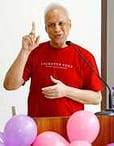Shri Jagat Singh Bisht
(Master Teacher: Happiness & Well-Being, Laughter Yoga Master Trainer, Author, Blogger, Educator, and Speaker.)
Authored six books on happiness: Cultivating Happiness, Nirvana – The Highest Happiness, Meditate Like the Buddha, Mission Happiness, A Flourishing Life, and The Little Book of Happiness. He served in a bank for thirty-five years and has been propagating happiness and well-being among people for the past twenty years. He is on a mission – Mission Happiness!
☆ # 03: Effortless practices for Happiness and Stress Management ☆
STRETCH, BEND, TWIST, TURN
“Walking is the best possible exercise. Habituate yourself to walk very far.”
Thomas Jefferson
Exercise freestyle. Do not stress, let it be fun. Stretch, bend, twist, turn, whirl, move, and jump.
Getting up early and going to a park in the neighbourhood could be a rewarding habit to develop. It gives you a whiff of fresh air and sunshine that makes you feel refreshed the whole day. Once you add it to your routine, you will start looking forward to the morning, and it will become a rewarding hour of the day for you.
Start with a gentle walk and then walk briskly. Twenty to thirty minutes of walking every day can do wonders for you in the long run. It is good for your circulatory system and relaxes you a great deal.
Watching the trees and the flowers while walking gives a healing and soothing touch to your senses. It relaxes your eyes and is good for your eyesight too! Walking is not just an exercise, it reduces stress. You feel relaxed.
Exercises are not only good for your body. They bring happiness and well-being. Whenever you feel low, get up and move out to the neighbourhood park.
Physically active people are happier. Also, they have better life-satisfaction, and higher self-esteem. Exercise reduces depression, anxiety, stress, and panic; it betters mental processing, creates longer life, improves sleep quality, and strengthens the immune system.
It is exercise itself that infuses us with happiness. Among various types of activities, exercise is the most reliable happiness boosting activity.
Find a quiet corner for yourself and just stretch, bend, twist, turn, and whirl your body in a freestyle manner. Do not worry too much. Nothing is right or wrong. Do whatever you feel like doing.
FREESTYLE EXERCISES
Walking, coupled with some freestyle exercises in a relaxed manner, brings multiple benefits. It stretches your skeletal structure, improves your blood circulation, and is good for your muscles. It is good for your heart and the respiratory track. This, in turn, activates your endocrine system.
Stand on both your feet in a balanced manner. Cross your palms, fingers interlocked, and stretch your arms straight above your head. Stretch, stretch, stretch! Keeping your palms interlocked, up above your head, bend to the right and then bend to the left. Now, take your palms in front of you, bend forward, and stretch.
Let your hands dangle freely below your waist. Twist your waist sidewise to the right and then to the left. Let your arms move slowly as if a washing machine is in motion. Twist your lower body and keep moving your arms sidewise for some time.
Close your fists and bring them close to tour chest. Twist your upper body and move your arms. keeping them together at chest height.
Raise your arms above your head and gently bend backwards from your waist. Stay there for a while. Then, raise your hands up and go on to bend forward, as far as you can comfortably. Raise your arms up again. Now, repeat the actions and swing your arms rhythmically, bending backward and forward. Inhale as you go up and exhale as you come down.
Open your arms wide, bring them forward crosswise, and hit the back of your shoulders with palms. Swing the arms back to wide open position. Bring them forward again, but this time keep the other arm on the top and hit the back of shoulders with palms. Alternatively, keep one arm on top and the other arm below. Keep on opening your arms and then swinging to hit the back of shoulders for some time.
Dangle your arms by the sides of your waist and then lift them up in a ‘V’ shape. Bring them back to the sides of your waist and then again take them up in a swinging action. Inhale as you go up and exhale as you come down.
Be on your toes and jump upward gently. Continue jumping for some time.
Place both your hands on your waist, breath in deeply through your nose, and exhale through your mouth making an ‘O’ with the lips. Repeat it thrice.
Stand balanced on both your feet. Stretch your arms fully sidewise. Turn to your right and whirl in a clockwise direction. Move slowly. Find an object at a distance and fix your gaze for a moment on it after each round. Go slow. Complete 10 – 20 rounds. Afterwards, stop and be stationary for some time. Do not move abruptly. If you feel dizzy, bend slightly, put your palms on your thighs, and look at the floor.
These exercises are only illustrative. You may add more of your own. Do not stress, let it be fun. Be freestyle. Stretch, bend, twist, turn, whirl, move, and jump. These exercises will make you feel good throughout the day. No equipment is needed. If you do not go out on any day, you may do these exercises at your home too.
EXERCISE
Play like a child.
Take permission from a group of children and join them in play. Play with them like a child.
Run, jump, and shout. Be fully immersed in the game. Forget the world.
Pour all your energy and heart into the game. Put in all your enthusiasm.
Enjoy the game.
Laugh whole heartedly.
Until you merge completely with the children. You are not an outsider who has joined them. Everyone is equal.
Sing, dance, play and laugh in unison with all of them. Enjoy the fun. Be a kid. Until you begin to perspire.
Have a hot shower and relax.
You feel positive and joyous.
Strenuous exercises may sometimes be harmful but light and freestyle exercises are always good. Go back to your childhood days, remember all the funny exercises you used to do, and try to re-create them. Gentle jogging, half jumps and stretching-bending exercises could be great fun, especially when done with children. The children would also be happy if you join them occasionally.
No equipment is needed, and you are not required to follow strict schedules. No membership fees and no registrations. Just have fun and get all the benefits. Include freestyle exercises in your routine. You will feel free and relaxed throughout the day.
“Physical fitness is the first requisite of happiness.
” Our interpretation of physical fitness is the attainment and maintenance of a uniformly developed body with a sound mind fully capable of naturally, easily, and satisfactorily performing our many and varied daily tasks with spontaneous zest and pleasure.
“To achieve the highest accomplishments within the scope of our capabilities in all walks of life we must constantly strive to acquire strong, healthy bodies and develop our minds to the limit of our ability.”
Return to Life/ Joseph Pilates and William Miller
“Research demonstrates that exercise may be the most reliable happiness booster of all activities.”
Sonja Lyubomirsky
♥ ♥ ♥ ♥
© Jagat Singh Bisht
Master Teacher: Happiness & Well-Being, Laughter Yoga Master Trainer, Author, Blogger, Educator, and Speaker
FounderLifeSkills
A Pathway to Authentic Happiness, Well-Being & A Fulfilling Life! We teach skills to lead a healthy, happy and meaningful life.
The Science of Happiness (Positive Psychology), Meditation, Yoga, Spirituality and Laughter Yoga. We conduct talks, seminars, workshops, retreats and training.
≈ Editor – Shri Hemant Bawankar/Editor (English) – Captain Pravin Raghuvanshi, NM







 ~
~






